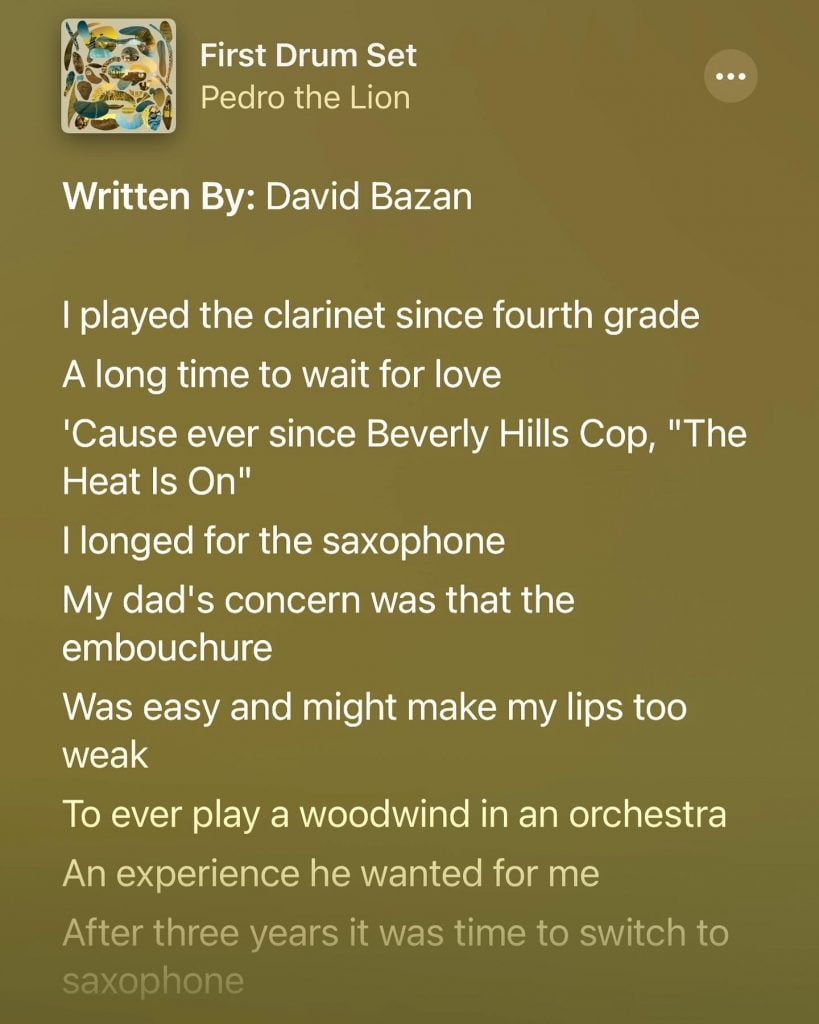It’s been a while since the last Weekender post — because I haven’t had any weekends for a while, and I’m posting this one quickly between grading stacks of papers on a Sunday.
But here are some things that have momentarily distracted me from my paper grading in the past few weeks…
I mean… C’mon! Pop Culture Happy Hour hails one of my 2021 favorites
Many thanks to the folks at Pop Culture Happy Hour for this thorough, nuanced, open-eyed, open-hearted conversation about — and celebration of — what may end up being my favorite American movie of 2022: C’MON C’MON.
Listen to it here:
Have you heard some Havasu?
A new Pedro the Lion album, Havasu, just arrived! It plays like a melancholy memoir, reflections on early experiences of loneliness and longing, with the great David Bazan writing and singing at the peak of his art.
Here’s a description from Polyvinyl Records:
Lake Havasu is a community of winding hillside roads, launched in the 1960s alongside a brick-for-brick rebuild of the original London Bridge. “It’s this very synthetic, gimmicky place set in this soulful, desolate landscape,” laughs Pedro The Lion’s David Bazan, who moved to the Arizona city for one year in seventh grade. Bazan collected his earliest childhood experiences for 2019’s Phoenix, the prolific artist’s celebrated return to the Pedro moniker and the first in a planned series of five records chronicling his past homes. To write its sequel, Bazan traveled to Havasu four times over several years, driving past his junior high campus, a magical skating rink, and other nostalgic locations that evoked feelings long suppressed.
As he worked through the music that became Havasu, flexibility and curiosity informed the arrangements. Bazan began writing on a simple synthesizer and drum machine setup. He detoured to a more elaborate assortment of analog electronic equipment, then woodshed his original two-handed keyboard arrangements on fingerpicked acoustic guitar. When he entered the studio with co-producer and engineer Andy D. Park (who worked in the same capacity on Phoenix), Bazan planned to make a desolate, desert-informed record. But the duo quickly realized a rock configuration closer to Pedro’s classic sound would convey the landscape and stories best. Bazan switched to a Les Paul, which brought smoothness and linearity; though he’d planned to use a drum machine, he laid down scratch drum kit and bass as an experiment. Listening back the next day, those initial rhythm section takes had a sense of joy and ease that augmented the record’s themes of psychic healing. Yet the contrasting optimism of the music reflects an imperative to communicate feelings both light and heavy: to break through the scar tissue of tender memory and find peace.
Though the next three albums in the series are not fully written, Bazan currently understands Phoenix and Havasu together as a completed exposition in a traditional three-act structure. Though these careful compositions pave the way for darker stories in later acts, Bazan resolutely emphasizes the curative nature of returning to Havasu, mentally and musically. “It gave me the ability to make vulnerable choices, and connect with a part of my younger self that I didn’t want to turn my back on,” he suggests. “I worked through a lot of self-judgment, and was kinder to myself on this record than I have been before in any songs.” The result is an open-hearted acknowledgment of shame and elation both, spaciously but delicately arranged in affirmation of the nurturing those feelings deserve—even if the kid in need of validation has long since grown up and moved away.
Here’s the song I’ve just quoted:
At the moment, you can stream the whole album at Polyvinyl’s YouTube channel.
David Dark on The Power of the Dog
One of my favorite Christian writers has contributed a review to The Christian Century on one of my favorite films of the year:
In her newest movie, The Power of the Dog … Campion turns her attention to the myths of masculinity born out of the fantasies of the Wild West.
…
[S]et within a larger Campion canon it seems all but inevitable that blood will be shed. But masculine violence—no matter how real and pervasive—almost never has the last word in a Campion movie. In this case, the ending is so surprising and electrifying you will want to go back and rewatch the entire movie immediately.
A dubious first for Redeeming Love… and for “Christian movies”
Longtime Christian-media film critic Peter T. Chattaway noticed this:
At The AV Club, A.A. Dowd describes the movie like so:
Redeeming Love is a kinky power fantasy in the halfway convincing disguise of wholesome faith-based entertainment.
…
[The film] has none of the sub-professional production values or hysterical culture-war dog-whistling of a Pure Flick. (Though the villain, a pedophiliac baron named The Duke, does firm up his ungodly bona fides by performing forced abortions). The film is more like the cinematic equivalent of Christian rock, vaguely approximating the appeal of a sweeping Western romance for the churchgoing crowd.
…
What we’re seeing, in the end, is a kind of merging of courtship and missionary work: a denominational Harlequin romance where getting the girl and saving her soul are one and the same. Isn’t the pushy determination of a smitten boy who refuses to take no for an answer a kissing cousin to tireless evangelizing? Those not charmed or aroused by the story of a woman who eventually relents to the entreaties of a preachy suitor, if only as an alternative to the nonstop misery she’s otherwise experienced, will be left to acknowledge the screaming void where the chemistry should be. There’s no real tension here, because Michael is a boringly incorruptible saint, waiting patiently for the woman he doesn’t know but loves all the same to come around. Maybe there’s an accidental critique in Redeeming Love, a twin portrait of seduction and conversion as acts of just steadily wearing someone down.
At The Aisle Seat, Mike McGranaghan writes,
Redeeming Love is ostensibly about how being treated with compassion changes Angel’s life. Oddly, though, the character has very little agency in the movie. Things happen to her, as opposed to having her make things happen for herself. Worse, the story makes it clear that any positive event in her life is given to her by Michael. When they finally have sex, for instance, it’s implied that she experiences orgasm for the first time. Rather than coming away with the impression that Angel’s life is changed by being introduced to God’s love, the film suggests that, by being devout in his faith, Michael is blessed by the Lord with the beautiful and sexually-gratifying wife he desires.
Wilford savors Licorice Pizza
One of my favorite writers on cinema, Lauren Wilford has weighed in on Licorice Pizza. Even when she posts first impressions of a film casually, I know I’m reading some of the best writing I will read on that film. This post is no exception.
Who will Mary Elizabeth Winstead play in the Star Wars universe?
Elvis Costello and the Imposters introduce A Boy Named If
Elvis Costello & the Imposters released a searing, blistering new array of extravagant rock performances last week.
At 67, Costello shows no sign of slowing down or losing his voice (if anything, he’s speeding up and getting louder), and his melodies are as complicated and surprising as ever. The lyrics are, as usual literary narratives that challenge listeners beyond what most will be patient enough to make sense of. But the noise is glorious.
Thanks to music critic Josh Hurst for tweeting it to my attention: “I’ve had the new Elvis Costello record on constant repeat since its release last week. A sensational tribute to his gifts with melody, and to the mighty firepower of the Imposters. Definitely an early highlight for this year.” Follow Josh on Twitter @ joshhurst.
Josh Hurst:




